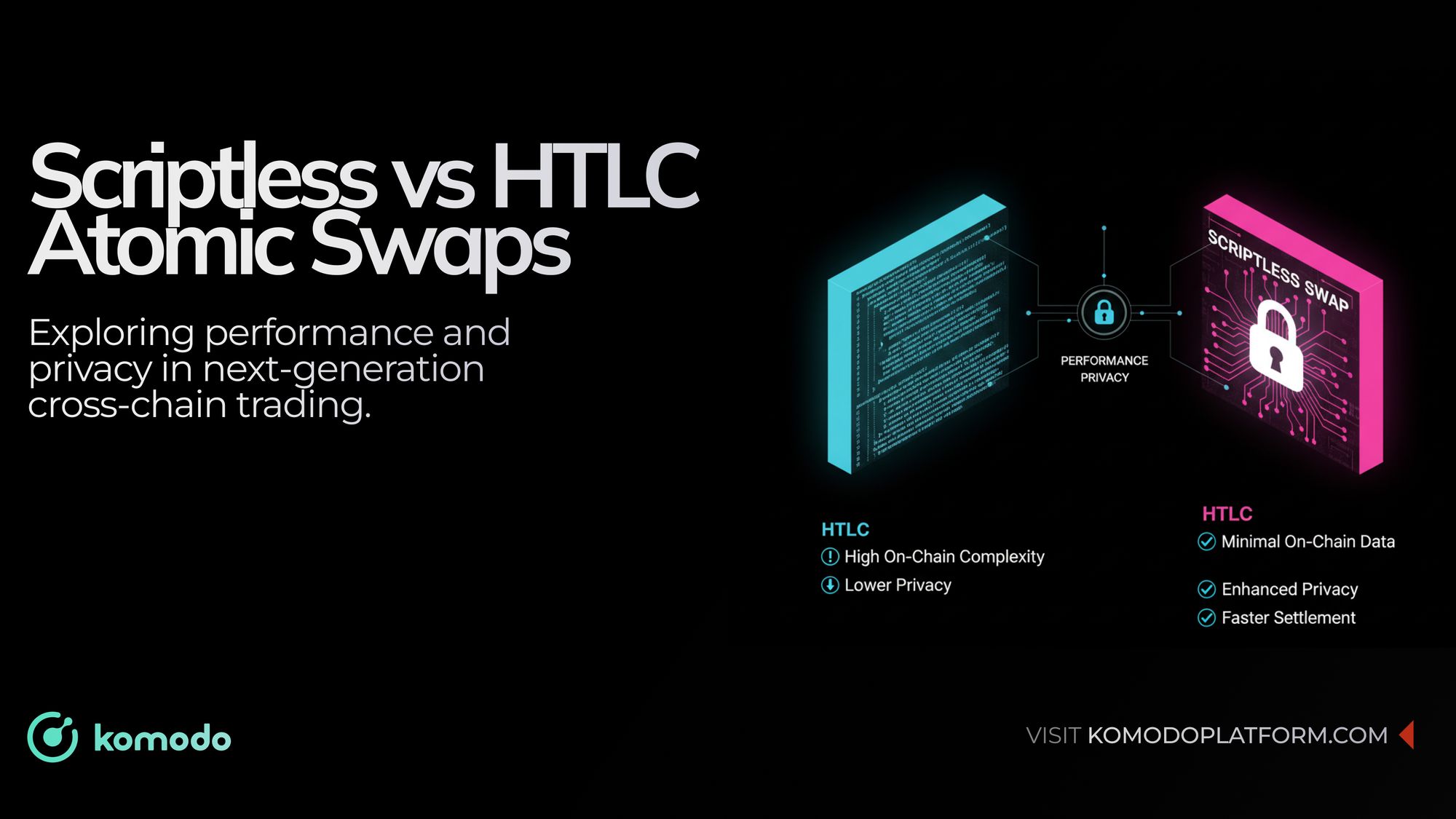Atomic swaps allow users to trade cryptocurrencies across different blockchains without relying on a centralized exchange. Both HTLC vs scriptless atomic swap models aim to achieve trustless trading, but they differ considerably in execution, efficiency, and privacy. Komodo Platform supports secure cross-chain swaps today while discovering the latest innovations to advance decentralized trading.
Comparing HTLC and Scriptless Atomic Swap Models
Understanding the differences between HTLC and scriptless atomic swap models is essential for evaluating trade-offs in security, efficiency, and privacy, and for choosing the best approach for specific cross-chain use cases.
How HTLCs Work
Hashed Timelock Contracts (HTLCs) use a combination of cryptographic hashes and time locks to secure trades. A participant creates a contract specifying a hash of a secret. The counterparty can claim the funds only by revealing the secret within a set time window. If the swap is not completed, funds are refunded automatically.
Key points about HTLCs:
- Security relies on the hash preimage being revealed on-chain.
- Widely compatible with Bitcoin and many UTXO-based systems.
- Provides clear conditional logic visible to all network participants.
How Scriptless Atomic Swaps Work
Scriptless atomic swaps rely on cryptographic signatures rather than on-chain scripts. Conditional execution is embedded in the digital signature itself, which allows the swap to occur without revealing the underlying conditions publicly.
Benefits of scriptless swaps
Scriptless swaps streamline the trading process by keeping sensitive details private and reducing on-chain complexity. They enable faster, more efficient transactions without sacrificing security.
- Swap details remain hidden, increasing privacy.
- Minimal on-chain data improves performance.
- Reduces reliance on complex scripts or multiple transactions.
These atomic swap protocol differences signify a change in decentralized exchange innovation, where privacy, scalability, and efficiency are becoming increasingly critical.
Performance Comparison
By comparing HTLC and scriptless swap models, we can better understand how each approach handles these challenges and where innovations like scriptless swaps offer tangible advantages.
Transaction Complexity and Speed
HTLC-based swaps require multiple on-chain transactions: one to lock funds, one to redeem, and sometimes one for refunds. Each step increases network load and confirmation time.
Scriptless swaps, by contrast, execute conditional logic off-chain using signature schemes, reducing the number of required transactions. This lowers network congestion and accelerates swap settlement.
Scalability Advantages
Reduced transaction size in scriptless swaps also means lower fees and better scalability for high-volume trading. Komodo Wallet continuously estimates such innovations to maintain seamless, cost-efficient cross-chain experiences as decentralized markets grow.
Atomic swap protocol differences in performance indicate that scriptless designs are well-suited for future blockchain scaling while HTLCs remain reliable for current multi-chain environments.
Privacy Comparison
Privacy is a key consideration when executing atomic swaps, as the visibility of transaction details can impact both security and confidentiality. Different swap models handle sensitive information in distinct ways, affecting how much data is exposed to the network and third parties. Comparing HTLC and scriptless atomic swaps highlights how each approach balances transparency, traceability, and user privacy.
On-Chain Exposure
HTLCs reveal hash preimages on-chain, meaning transaction details are partially visible to all network participants. This transparency makes sure trustless execution but can reveal sensitive trading information.
Scriptless atomic swaps, however, keep all conditional data hidden in cryptographic signatures. Only the final settlement is visible on-chain, preventing third parties from deducing trade specifics.
Confidentiality Benefits
- HTLC - Traceable and publicly verifiable; less private.
- Scriptless - Confidential and less prone to network analysis; stronger privacy guarantees.
These atomic swap protocol differences are increasingly essential for users concerned with anonymity and secure trading, especially in environments requiring minimal traceability.
Komodo Wallet’s Role in Native Atomic Swaps
As cross-chain trading grows in popularity, having a reliable and secure wallet infrastructure is critical for decentralized finance. Komodo Wallet serves as a foundational tool that not only facilitates seamless atomic swaps but also empowers users with full control over their assets, minimizing reliance on centralized intermediaries.
Leadership in Trustless Trading
Komodo Wallet allows users to execute cross-chain atomic swaps natively, without bridges or wrapped tokens. Its open-source framework ensures transparency and security while giving users full control of their funds.
Preparing for the Next Generation of Swaps
By monitoring innovations like scriptless atomic swaps, Komodo Wallet makes sure it remains adaptable to future decentralized exchange trends. This commitment aligns with Komodo’s mission of enabling secure, self-custodial trading without intermediaries.
Start Trading Securely with Komodo’s Trustless Atomic Swap Technology
Experience the benefits of native atomic swaps with Komodo Wallet:
- Bridge-free trading - Swap assets directly across chains without intermediaries.
- Self-custody - Maintain full control of your funds.
- Open-source transparency - Trust the code, not a third party.
Download Komodo Wallet today to trade across major blockchains safely, efficiently, and privately.
FAQs
What is the main difference between HTLC and scriptless atomic swap models?
HTLCs rely on hash preimages and on-chain contracts, while scriptless swaps embed conditions within cryptographic signatures, keeping swap details hidden.
Why are scriptless atomic swaps considered more private?
Because they do not reveal hash preimages or swap logic on-chain, preventing network participants from seeing trade specifics.
What makes HTLCs more widely adopted today?
HTLCs are compatible with many UTXO-based blockchains and have predictable execution patterns, making them reliable for existing decentralized exchange infrastructures.
